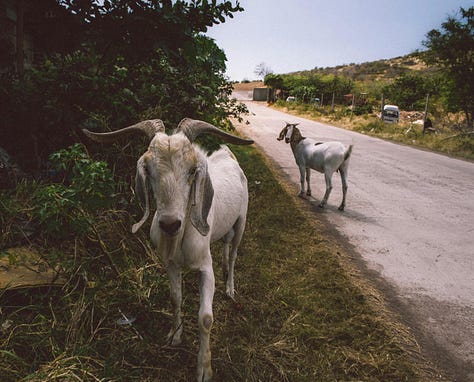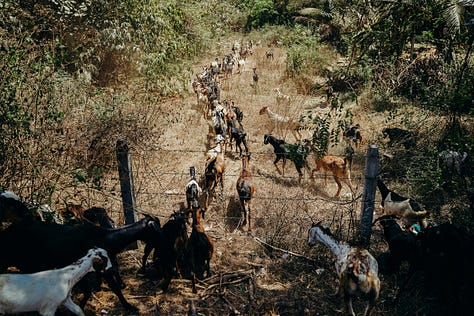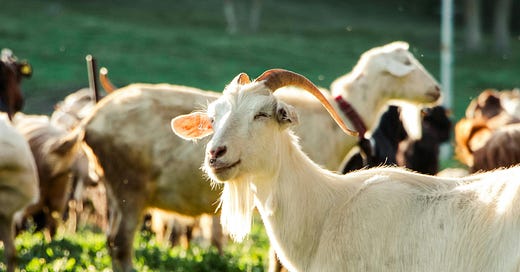In a state plagued by devastating wildfires, California has joined an increasing number of states and communities that have turned to an unconventional yet highly effective method for wildfire prevention: goats. A recent Animal Politics article titled Goats to the Rescue, reported on the City of Toronto’s program to manage invasive urban vegetation. A reader of that article brought to my attention that California too is leveraging these four-legged grazers as firefighters to clear away dry brush and overgrown vegetation, which are common fuel sources for wildfires.
The Role of Goats in Wildfire Prevention
Goats are natural grazers with an insatiable appetite for a wide variety of plants, including those that are highly flammable. Their grazing habits help to clear large areas of vegetation, creating natural firebreaks that can slow the spread of wildfires. Michael Choi, the proprietor of Fire Grazers Inc., leads a team of approximately 900 goats that can consume up to an acre of brush daily. This method is not only effective but also environmentally friendly, as it reduces the need for mechanical clearing and chemical herbicides.
Case Studies and Success Stories
Fire Grazers Inc.: Choi's company has been instrumental in wildfire prevention across California. His goats have been deployed in various cities, including Rancho Palos Verdes, Torrance, and Westlake Village, to clear brush and reduce fire risk. Choi emphasizes the importance of this work, noting that his own home was saved from a wildfire thanks to the efforts of his goats.
San Diego Gas & Electric (SDG&E): SDG&E has implemented a goat grazing program as part of its Land Services Abatement Program. This initiative has proven to be an effective and climate-conscious method to mitigate wildfire risks. The goats are strategically deployed to clear dry vegetation in high-risk areas, reducing the potential fuel for fires.
Paso Robles: The city of Paso Robles has seen a significant reduction in the size of fires since implementing a goat grazing program in 2020. The goats graze along the Salinas River, clearing vegetation that could catch fire and helping to revive the surrounding environment.
Challenges and Future Prospects
While the use of goats for wildfire prevention has been successful, it is not without challenges. New labor regulations in California could significantly increase the cost of providing goat-grazing services. These regulations could raise the monthly salary of herders from about $3,730 to $14,000, potentially putting herding companies out of business. Advocates argue that while herders deserve fair wages, the proposed increases are not sustainable for the industry.
Despite these challenges, the demand for goat grazing services continues to grow. Many communities and organizations recognize the benefits of this eco-friendly and effective method of wildfire prevention. As California continues to invest in innovative solutions to combat wildfires, goats are likely to remain a crucial part of the state's strategy.



Strategies to Contain Costs
To address the financial challenges and ensure the sustainability of goat-grazing services, several strategies are being considered. For instance, the goat-herding industry is pushing for legislative changes to reclassify goat herders' compensation to reflect the unique nature of their work, which involves being on-call 24/7. This reclassification aims to maintain the affordability of goat-grazing services while ensuring fair wages for herders. At the same time, grazing companies can improve operational efficiencies to reduce costs. This includes optimizing herd management practices, investing in better equipment, and utilizing technology to monitor and manage grazing activities more effectively.
Moreover, given the significant cost savings incurred by preventing wildfires, there is a strong case for government support. Local and state governments could provide subsidies or grants to offset the increased labor costs. For instance, the California Department of Forestry and Fire Protection has already awarded grants for grazing projects that have proven effective in reducing wildfire risks.
Additionally, partnerships between government agencies, private landowners, and grazing companies can help distribute the financial burden. These collaborations ensure that costs are shared and the benefits of reduced wildfire risks are maximized. Cities like West Sacramento have demonstrated the effectiveness of such partnerships by hiring goat-grazing services to clear vegetation in high-risk areas.
Communities can also explore alternative funding models, such as community-supported grazing programs or environmental impact bonds, which could provide additional financial resources. These models engage the community and investors in supporting sustainable wildfire prevention practices.
Conclusion and Call to Action
The use of goats for wildfire prevention in California is a valuable and eco-friendly method that has proven to be effective. However, the financial sustainability of this practice is currently threatened by new labor regulations. By advocating for legislative changes, seeking government support, forming public-private partnerships, exploring innovative funding models, and improving operational efficiencies, the industry can continue to provide this essential service while ensuring fair compensation for herders.
To ensure the continued success and sustainability of goat-grazing services for wildfire prevention, it is crucial for stakeholders to take action. I urge policymakers to consider legislative adjustments that fairly compensate herders while keeping the service affordable. Local and state governments should explore funding opportunities to support these eco-friendly initiatives. Additionally, private landowners and community members are encouraged to form partnerships and invest in innovative funding models to share the financial burden and maximize the benefits of reduced wildfire risks.
Call to Action
For those interested in advocating for these changes, contact your local representatives and the California Labor Commissioner. Specifically, you can reach out to Assembly Members Megan Dahle and James Gallagher, who have introduced relevant legislation (AB 1099) addressing goat herders' labor protections.
Additionally, engaging with organizations like the California Farm Bureau and the California Climate and Agriculture Network can amplify your voice in this critical issue.
By working together, we can maintain and expand the mutually beneficial use of goats as a valuable tool in wildfire prevention, protecting our communities and environment from the devastating impacts of wildfires.
Ed Boks is a former Executive Director of the New York City, Los Angeles, and Maricopa County Animal Care & Control Departments. He is available for consultations. His work has been published in the LA Times, New York Times, Newsweek, Real Clear Policy, Sentient Media, and now on Animal Politics with Ed Boks.
Contact Ed Boks Consulting to help transform your organization's approach to animal welfare! With a proven track record in some of the largest animal control programs in the United States, Ed Boks offers unparalleled expertise in strategic planning, program development, and organizational efficiency. Whether you need help with capacity building, crisis management, or legislative lobbying, Ed Boks Consulting provides the innovative, compassionate solutions your organization needs to achieve and sustain success. Don't wait—reach out now to start making a life-saving difference! Contact Ed Boks Consulting at: animalpolitics8@gmail.com





It figures that California would deliberately make it harder to control 'wild' fires by over-regulating everything. How about instead of raising the salaries of these herders, we stop sending all our money to wars we don't support and people who are in our country illegally. Then, take that money and pour it into programs-like goats for brush control- that actually support OUR country. Give these herders the same benefits state workers receive.
Just one note:goats are browsers, not grazers.
Goats are used similarly around Seattle, WA, especially to remove very thorny wild blackberry bushes which proliferate all too well there:
“5 Best Places to Rent Goats in Seattle ; 1. Rent A Ruminant ; 2. Amazin' Grazers ; 3. The Goat Lady ; 4. Healing Hooves ; 5. West Side Goat Girl” https://conyersrealtor.wordpress.com/2017/04/23/5-best-places-to-rent-goats-in-seattle/
https://www.rentaruminant.com
https://www.evergreengoatrentalsbrushclearing.com